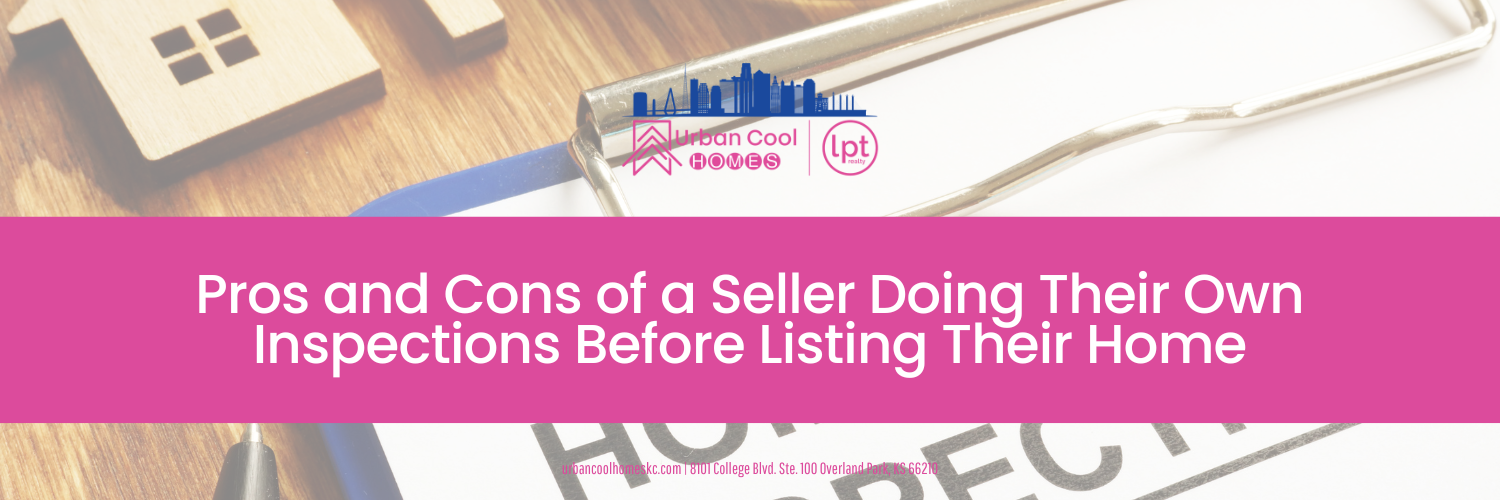Pros and Cons of a Seller Doing Their Own Inspections Before Listing Their Home

When preparing to sell a home, most sellers think about cleaning, staging, and marketing. But one decision that often gets overlooked is whether to complete a pre-listing home inspection before putting the property on the market. While traditionally buyers order inspections after going under contract, more sellers are now choosing to do their own inspections up front. Is this a smart move—or just added stress and expense? Let’s break down the pros and cons of pre-listing inspections so you can decide if it’s the right strategy for your situation.
What Is a Pre-Listing Inspection?
A pre-listing inspection is when the seller hires a licensed home inspector to evaluate the property before it officially goes on the market. The inspector will typically review major systems and components such as:
-
Roof, foundation, and structural elements
-
Plumbing, electrical, and HVAC systems
-
Windows, doors, and insulation
-
Appliances and safety items
Essentially, the inspector checks the same things a buyer’s inspector would—only the seller receives the report first.
The Pros of Doing Your Own Inspection Before Listing
1. Gain Control Over the Selling Process
One of the biggest advantages of a pre-listing inspection is that it allows you to stay in control. Rather than being blindsided by issues during negotiations, you’ll know what a buyer’s inspector is likely to find. This knowledge reduces surprises and gives you more time to plan.
SEO angle: Many sellers search for “how to avoid surprises in home inspections”—a pre-listing inspection is often the answer.
2. Opportunity to Make Repairs in Advance
If the inspection reveals problems—such as a leaky roof, aging furnace, or foundation crack—you can choose whether to fix them before listing.
-
Making the repairs may help your home sell faster and for more money.
-
You’ll have the chance to hire contractors on your own schedule, often at a lower cost than rushing to fix items during escrow.
This proactive approach shows buyers you’ve cared for the home, which can boost confidence and reduce stress later.
3. Ability to Price Accurately
Overpricing a home is a common mistake. If your house needs major repairs you didn’t account for, buyers will negotiate hard or walk away. A pre-listing inspection allows you to set a realistic price that factors in the true condition of the property.
On the flip side, if the report shows your home is in excellent shape, you may justify a higher asking price or stand firm against lowball offers.
4. Increased Buyer Confidence
Buyers love transparency. Providing an inspection report up front demonstrates honesty and reduces suspicion. This can lead to:
-
More serious offers
-
Fewer deal fall-throughs
-
Shorter days on market
In competitive markets, offering a clean inspection report can even spark multiple offers.
5. Smoother Negotiations
Negotiations often get messy after the buyer’s inspection. Sellers may feel pressured to make costly repairs or give big credits. By doing your inspection first, you can eliminate much of the back-and-forth drama.
If repairs are already completed—or if the buyer is aware of issues before making an offer—the chance of a contract falling apart decreases significantly.
6. Appeals to Relocation or First-Time Buyers
Certain buyers—especially those relocating from out of town or purchasing their first home—appreciate the reassurance of a pre-listing inspection. They may be more likely to make a quick, confident offer when they see a professional report already in hand.
The Cons of Doing Your Own Inspection Before Listing
1. Upfront Cost
A professional inspection typically costs $300–$600, depending on the size of your home. If additional specialized inspections are recommended (radon, sewer line, roof, or termite), the bill can climb higher.
While this investment may save money later, some sellers aren’t willing to pay out of pocket before they’ve even received an offer.
2. Legal Disclosure Obligations
In many states, once you know about a defect, you’re legally required to disclose it to buyers—even if you don’t fix it. That means if your pre-listing inspection reveals a major foundation issue, you can’t just ignore it.
Some sellers prefer not to know, because ignorance (while risky) reduces their disclosure burden. Always check your state’s disclosure laws before committing.
3. Buyers May Still Do Their Own Inspection
Even if you provide a thorough inspection report, most buyers will still hire their own inspector. They may view your report as biased, since you chose and paid the inspector. If their inspector finds additional issues, you could still end up negotiating repairs twice.
4. Potential for Over-Improving
Sometimes sellers, eager to make their homes “perfect,” sink thousands of dollars into repairs that don’t actually impact the selling price. For example:
-
Replacing perfectly functional but older appliances
-
Installing brand-new windows when repairs would suffice
-
Upgrading systems buyers didn’t expect to be brand new
Over-investing in pre-listing repairs can reduce your return on investment.
5. Market Timing Delays
If your inspection reveals issues and you decide to make repairs, your home may be delayed from hitting the market. In a fast-moving real estate climate, this could cost you valuable time and momentum.
Sometimes, it’s better to get listed quickly and let buyers factor repairs into their offers.
6. Buyers May Use Report Against You
While transparency often builds trust, it can also give buyers leverage. For instance, if your report highlights a 15-year-old roof nearing the end of its life, a buyer may offer less—even if the roof still has years left. Sharing too much detail upfront can sometimes hurt negotiations.
Who Benefits Most From a Pre-Listing Inspection?
Not every seller needs one. A pre-listing inspection is most beneficial if:
-
Your home is older or has visible signs of wear
-
You’ve lived in the home for decades and aren’t sure about its systems
-
You want to sell quickly and avoid last-minute delays
-
You’re targeting first-time buyers or relocating buyers who value reassurance
-
You’re willing to make repairs (or adjust price) based on findings
If your home is newer, well-maintained, or located in a strong seller’s market, skipping the inspection may be fine.
How to Decide If It’s Right for You
Here’s a simple framework:
-
Evaluate your home’s condition. Is it older or in need of updates? If yes, an inspection may be wise.
-
Check your finances. Do you have money to cover inspection costs and potential repairs?
-
Review your timeline. Can you afford to delay listing if major issues appear?
-
Talk to your Realtor. An experienced agent can weigh local market conditions and advise whether a pre-listing inspection will strengthen or weaken your position.
Pro Tips for Sellers Considering Pre-Listing Inspections
-
Hire a reputable inspector. Ask for recommendations from your Realtor and check reviews.
-
Fix only what matters. Prioritize repairs that affect safety, structural integrity, or financing approval (like roof leaks or faulty wiring).
-
Keep documentation. Save receipts and contractor invoices to show buyers the work was done professionally.
-
Use it as a marketing tool. Highlight “pre-inspected and repaired” in your listing description to stand out from the competition.
Final Thoughts: Is a Pre-Listing Inspection Worth It?
The decision comes down to control versus cost. A pre-listing inspection can give you peace of mind, smoother negotiations, and more accurate pricing—but it also brings upfront expenses, potential disclosure obligations, and the possibility of double inspections.
For many sellers, the peace of mind and negotiating power are worth the investment. For others, especially in hot seller’s markets, it may be an unnecessary step.
The best move? Discuss it with your trusted Realtor. They’ll know whether a pre-listing inspection will give you a competitive edge in your specific market.
Categories
Recent Posts











